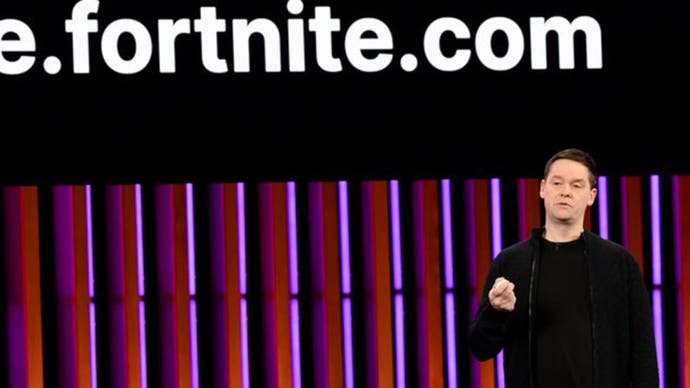Epic Games: mobile "gatekeeping" is "at the heart of why the industry is in a rut"
Saxs Persson talks storefronts, UGC, and "rehabilitating" the word "metaverse".
Back in September of 2023, the European Union officially designated Apple a "gatekeeper" under the Digital Markets Act (DMA), stipulating that it must open its App Store on iOS in a number of ways, including adding the ability to "side-load" apps from the web rather than the store, to have other storefronts available, and more.
If you've been even vaguely following the issue, you'll know this is all of particular interest to Epic Games - in fact much of it is being driven by Epic Games' complaints, going back to its in-game "Free Fortnite" campaign after Epic intentionally broke Apple's rules to get Fortnite kicked off the platform. In the years since, Epic's founder and CEO Tim Sweeney has continued to be vocal on the topic. Responding to a Tweet that suggested it took 15 steps to side-load an app under Apple's proposed, post-DMA solution, Sweeney called it "the worst app installation experience in the history of computing!", an "abomination" and an example of "malicious compliance" of the ruling.
Apple, for its part, maintains that this is all part of its efforts to maintain things like safety and privacy, while the specifics of the ruling itself, and Apple's compliance with it, quickly become quite technical. There is some suggestion the EU has asked for exactly what Apple has done - to both prevent Apple "gatekeeping" and simultaneously require it maintains the upsides of what that gatekeeping enables. All the while, there's been significant tit-for-tat between Apple and Epic, with Epic having its developer account banned, and then reinstated, before the EU signalled it would be taking a closer view.
Where video games are involved are, firstly, in Fortnite itself, but also in the presence of the Epic Games store. Speaking with Eurogamer at GDC in late March, Epic executive vice-president Saxs Persson had things to say about both of these - but also made a wider point about what was, in his opinion, an issue that held back not just Epic but the industry as a whole.
Persson heads up Epic's efforts with Lego Fortnite, Unreal Editor For Fortnite (UEFN), Fortnite Creative, and the "Creator Economy 2.0". Like Sweeney, he's also candid and openly opinionated about the dispute with Apple, noting that Epic very much expects the company to further relent on issues of compliance with the DMA. One issue was those apparent 15 steps to side-loading apps. Does Epic hope that gets better?
"We're betting on it, yeah," Persson said. "We're not hoping. We fully expect that people will see through - like, this is not an honest attempt to comply with an order. They have an order from the Digital Markets Act, the DMA, and we expect them to follow it. Why wouldn't we?"
"In the meantime, we're making the store that we want to make, and we'll be ready to launch that later this year. And then hopefully, the regulatory environment, once they clear the dust, stuff will happen."
This brought Persson onto the broader issue of "gatekeeping" as a whole, which came up a few times during the conversation. "Gatekeeping: the point remains the same on mobile - like, why is the industry in a rut? Part of it's gatekeeping."
"It's the same on mobile platforms; gatekeeping is at the heart of why the industry is in a rut. Because it's very, very difficult to build a business under the circumstances - for the things that you would want to build - in which you are restricted, in such an extreme sense, to how you are controlled. The experience, the customer, store, post-sale purchases, and out-of-game purchases. Every single aspect of it is controlled to a point where it makes it really difficult to make it viable."
Much of what Epic hopes to do here, and to which Persson is seemingly referring when he mentions the ways in which Epic is "restricted", comes back to the notion of the "metaverse". Something you could now justifiably call a dreaded term, but that ostensibly means a virtual world where different brands or concepts interact, the phrase "metaverse" has picked up all kinds of connotations, notably from the company Meta, formerly Facebook, where virtual reality remains a major play, but also from the even less scrupulous, buzzword-following worlds of Web3, blockchain games, and NFTs. Persson meanwhile has previous experience in some semi-related areas like VR and AR, including a spell at Mojang and oversight of Microsoft's Project Spark.
Sweeney, meanwhile, has also been vocal about the promise of the "metaverse" as the future - although as some have recently pointed out, what many people mean when they use the word is simply: video games with crossovers. Does Persson still have faith in the vision, and has the word itself lost some value now?
"It's interesting," he said. "So Tim and I have different views on this. My view is that if there was a better word, we would use it. There just isn't - it's the best word, and just because somebody screwed it up, doesn't mean we can't use it!" he laughed. "So officially, we are rehabilitating the word.
"And Tim's view is the rehabilitation," Persson continued, "he doesn't think anybody should be allowed to ruin a word.
"My view is like, if there was a better word we would go for it. But there's just no better concept for what it is we're trying to propose - that Fortnite as it is right now is incredible."
Persson pointed to recent partnerships as an example. "I think the introduction of Lego, and Creators with Lego, is like, you could squint and you can see: 'Oh, I can kind of see what this is going to develop into'. You can see that we've signed a long-term partnership with Disney also - now we're talking about the world's preeminent play company, [one of the] most beloved brands in the world, and Disney. These are amazing people to make your home with, and to build something substantial with.
"But we've always felt like that has a natural limit - we will never be able to build the thing that holds all the things in the world," he said, before coming back to another term which, notably, had a prominent spot in the EU's ruling regarding Apple: interoperability. As in, things working seamlessly across devices from different manufacturers.
"What we have to work towards is interoperability between these major, major ecosystems, or we're essentially telling players: choose. Right? You can go with your mates, or you can play your game, or just, like, dissolve your party and then evolve your party again on this other platform. That doesn't make any sense when we could just move you between these two things," he said.
"There's many, many ways to do interoperability that are not all-or-nothing. Yes, we want an interoperable economy too, but we could start with just having compatible friends. That would be a pretty good move. So we still believe that's the right mission, to create a large, large ecosystem that can connect to whatever ecosystem works to extend those tendrils into it."
Across almost all of Persson's responsibilities at Epic, meanwhile, sits the concept of user-generated content, or UGC - a hot topic at GDC and, seemingly, in many video games industry boardrooms right now, as publishers survey their options for as yet untapped growth. Does he, like some others, view UGC as a panacea - or at least a possible solution to the problem?
"It's not a panacea," Persson said. "I think it's incredibly important not to be the gatekeepers of our own success.
"I think extending the very opportunity for people to be part of that is pivotal. I think it's pivotal for Fortnite's success. I do not believe - and this is a personal belief - that Fortnite would be this successful seven years in, if there hadn't been a Fortnite Creative when it came. It came at exactly the right moment, and did exactly what it needed to do, meaning: it gave people content choices, and it turned it into that irreverent place where you never know what you're gonna find.
"Is the content better now?" he continued. "Much. Are there more creators? Way more! Are they getting paid more? Yeah! But, in no way has that shaped the ecosystem in a way that players don't want. This is player-driven. They're telling us with their feet: we're going from here, to here, to here, to here, and that's why we play Fortnite, because it's not just Battle Royale.
"So, I think not being gatekeepers - not feeling like we're the smartest people in the room - is pivotal. Because that's what players are telling us they want."
Persson also spoke about Fortnite's approach to under-18s earning money on the platform, after Roblox Studio head's eye-opening comments last week.










